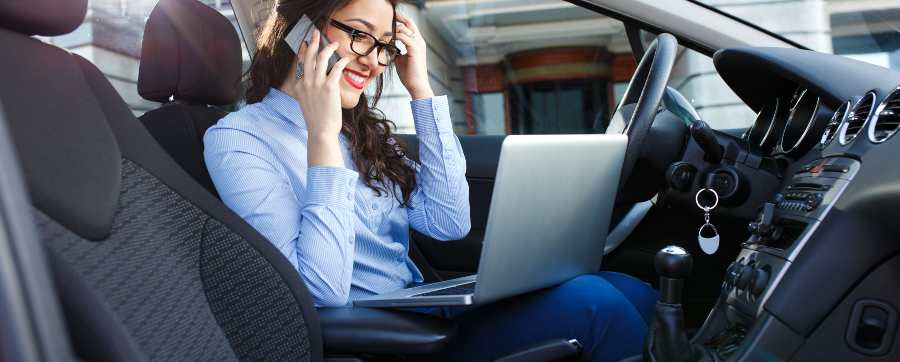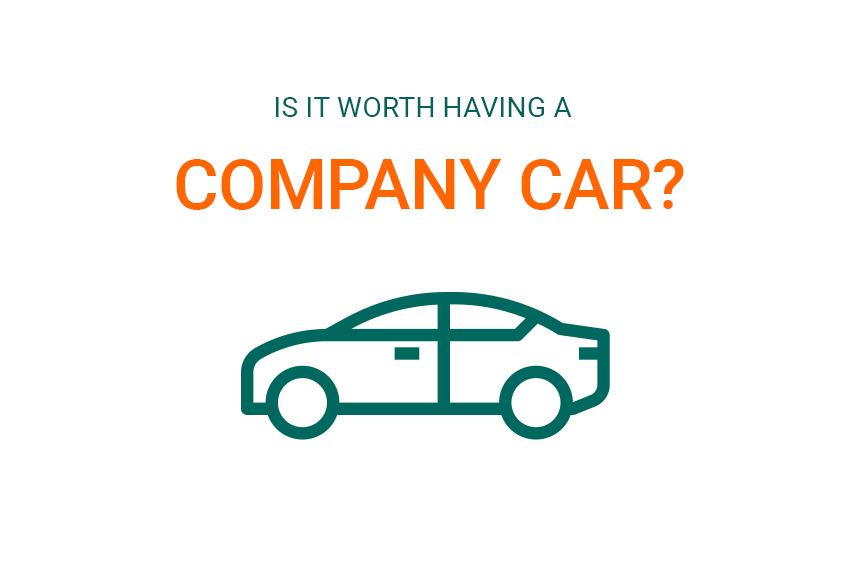Company cars have always been popular. They can be a great incentive to offer employees and a great way to attract the best candidates for your company.
But with the increasing changes to company car tax and the government crackdown on diesel cars, is it still worth having a company car?
In this article, we look at whether a company car is still worth it, and your alternatives.
What are the advantages and disadvantages of having a company car?
When you’re thinking about getting a company car there are lots of things to think about. It’s important to go in knowing both the advantages and disadvantages of the arrangement you’re considering.
What are the advantages of having a company car?
There are quite a few advantages to having a company car that are worth being aware of, these include:
- It’s a great incentive
- Research that OSV conducted shows that if a company car is offered, it will attract the best candidates for your company
- You could end up driving a nicer car for less money
- There are a lot of discounts to be found with brands such as Mercedes, Audi and BMW. This means that you could end up having a better car than you might have originally thought
- There are more deals to be had with business leasing
- This means the vehicle could end up cheaper to lease through your business rather than privately.
What are the disadvantages of having a company car?
However, there are also some disadvantages to having a company car that you should be aware of before you make a decision. These disadvantages include:
- Company car tax
- Possibly the biggest disadvantage of having a company car is that you will most likely have to pay company car tax
- There will be some cars that are considerably more expensive
- Due to company car tax, there could be cars that cost considerably more to lease through your business than they would personally. So, it isn’t always viable.
- There is an increased liability
- If your employees are using their company car for personal use, then you are liable for accidents pretty much round the clock. This increases risk for you.
- You will have to track personal use closely
- We will go into this in more detail later on in the article. But, if your company cars are to be used for personal journeys then you will have to track this.
How does Company Car Tax work?
If you use your company car for any personal journeys then you will have to pay Company Car Tax. These personal journeys include the commute to and from work.
How much you will pay in Company Car Tax is determined by the following;
- Your personal tax band
- The P11d value of the car
- The CO2 emissions of the car
Your Company Car Tax will be lower if the P11d value and CO2 emissions of the vehicle are lower, so this is something to consider when looking for a company car.
Once you have all this information you can work out how much you will be paying in Company Car Tax.

What is the P11d value of a car?
The P11d value is how much the vehicle is worth after all other costs have been added. This includes:
- The manufacturer’s list price for the vehicle
- Any delivery charge
- Any other options you have added to the vehicle – such as a sat-nav or privacy glass
- The VAT
Company Car Tax
In April 2017 the UK Government made changes to Company Car Tax. More bands were introduced at the lower end of the Benefit in Kind (BiK) scale.
The last time that BiK rates were introduced was in 2002, before the introduction of more environmentally-friendly cars on the roads. In order to encourage businesses to invest in low emission cars, the Government ensured that the BIK rates were considerably lower for vehicles that proved to be more environmentally-friendly.
This worked and was very successful at getting businesses to consider leasing or purchasing more efficient and eco-friendly cars for their fleet. However, it worked a little too well, and the government realised that the amount paid in Company Car Tax was reducing with every year.
In order to make things more equal, the Government introduced the changes to the lower end of the BiK scale in 2017.
Changes to BiK for Electric Vehicles 2020
In July 2019, HMRC announced they are making amendments to BiK for 2020. The biggest change is in hopes that it will encourage more companies to consider electric vehicles. From April 2020, electric vehicles will attract 0% BiK. They have released two separate BiK tables, one for those driving a company car registered before April 6th 2020, the other for company cars registered after that date.
According to the release from the Treasury, cars that are registered after April 6th 2020 will benefit from Company Car Tax rates that have been reduced by 2% on previous years.
If you are currently driving a company car that was registered before April 6th 2020 and has CO2 emissions of 1-50g/km that also has an all-electric range of 130 miles or more then you will also qualify for 0% BiK for 20/21.
In 2021/22 these rates will increase to 1% BiK, with a further increase to 2% in 2022/23.
Don’t let these changes put you off though. There is still a good chance that if you are leasing through your business you will get a better price than if you chose to lease privately.
Looking at leasing an electric vehicle but want to know more about the range, cost and charging times? Look no further than one of our comprehensive guides. They’re free and ready to download.
Is personal leasing or business leasing cheaper?
So, is leasing through your business cheaper than if you decide to get a personal lease?
It really depends. There may be occasions where leasing privately proves to be more financially viable than leasing through your business.
For example, if you were to lease a car that has a high P11d value and emits a high amount of CO2 then you may be better off leasing privately as you won’t have to pay company car tax.
But, on a large number of occasions, it can be cheaper to lease through your business.
However, we would recommend that you weigh up both options carefully and discuss them with your vehicle broker or dealership so that you know you’re making the right decision for your situation.
Have questions about the different leasing options available? Download our FREE guide to get the answers.
What are the business benefits to leasing?
As we mentioned above, there are plenty of business benefits to leasing. While the following do not apply to all contract types, they aren’t available to private individuals, they are exclusive to business leasing.
Tax benefits
When you are leasing your car through a VAT-registered company, you can claim 50% VAT back on the monthly payments. If you are leasing a van on a business lease then you can claim 100% of the VAT back.
However, there is an exception. If you use the car for personal purposes unrelated to work you cannot claim the VAT back.

You can claim the monthly cost of the lease against profits, though. How much you get to claim back varies. If your car emits more than 160g/km of CO2 then you can claim 85% back. If your car emits less than that, then you can claim 100% back against profits.
A better accounting solution
If you have a business contract hire, then the finance commitments can be “off balance-sheet” so the liability of the finance doesn’t appear on company accounts.
Your money isn’t wrapped up in a depreciating asset
At the end of a Business Contract Hire agreement, you give the car back with nothing more to pay (subject to mileage and condition restrictions). This means that your money isn’t tied up in a depreciating asset, which makes Business Contract Hire a very attractive prospect for businesses.
Is it worth having a company car?
In conclusion, is it worth having a company car?
We are going to say yes. Despite the rise in company car tax, leasing through your business will still cost less. You also have the business benefits to leasing that you do not get if you lease privately, and these benefits can outweigh the fact that you have to pay Company Car Tax.
There may be times when it’s better for you to choose a personal lease rather than a business lease. One of these circumstances is when the vehicle you have decided upon emits a lot of CO2. In that particular situation, a company car is not worth it. However, we do recommend that you review all the options available to you before coming to an informed decision about the option that is best for your situation.


Company car for me works cheaper. car Insurance, maintenance, road tax all included on the company car. As I chose a hybrid car, it only cost me BIK of £75/month. Using my own car, I would pay all these + mot which is around £700 per year (£58/month). but then you also need to add the depreciation of the car + any unexpected parts/consumables needs replaced i.e tyres, breakpads etc.
The way I see it, a company car is great if you have the wage left to support a decent living. for example, if your paid £1500 Gross, lose say 300 to tax, another 100 to insurance and 50 to pension, although it is nice having a company car that you pay no maintenance, you quite easily insure a £200 banger for the year to get to work and back and have more money left in your wage. So the way I see it unless you are paid a sum over the company car tax, they aren’t financially viable in my opinion.
Hi Jordan,
Thank you for your comment. A company car is a perk that you would receive an allowance for when it comes to mileage. The HMRC has a calculator that will work out what the eligibility for tax would be, you can find that here: HMRC Calculator. Of course it is a personal decision as to whether you take the offer if it is made by your organisation.
but if the car that is offered is a basic model Insignia, worth 6k after 2 years, you may as well opt out (if this an option) and buy a better model for less money ! especially if you are in the 40% tax bracket.
Hi Paul,
Thank you for your comment. With the new regulations being introduced as of April 2020, it is worth companies looking to consider electric models (with BiK being 0% on these vehicles for employees). However, it does depend on the model offered, and this is something they need to consider when the options are presented to them.
I have a Vauxhall Insignia diesel 1.6 estate it is now 4 years old with 60.000-+ miles. It was due to be changed 8 weeks ago however as yet it hasn’t. I have £6.3K taken a year in income tax s I have the car for private use. I pay for the fuel and claim company miles done every month at a rate of 10.1p a mile. This amount that I claim each month is then subject to income tax. My company claim back VAT that I have paid on the fuel. this is after I have paid my expected income tax on my salary. In effect I am taxed three times 1) Income Tax. 2) VAT at the point of sale. 3) income Taxed again on expenses paid to me every month. My question is Company Car yes or No? also should I be taxed on payment of expenses due to me?
Hi Frank,
A company car can be an economical one for the driver and for the company. If you are thinking of getting a new vehicle through the company, it may be worth considering looking at an electric vehicle, as these are subject to a much lower rate of company car tax, in fact, for 2020-21 they are subject to 0%. We have a comprehensive article on the benefits of getting (or not) a company car, you can find it here: https://www.osv.ltd.uk/ultimate-guide-to-company-car-tax/